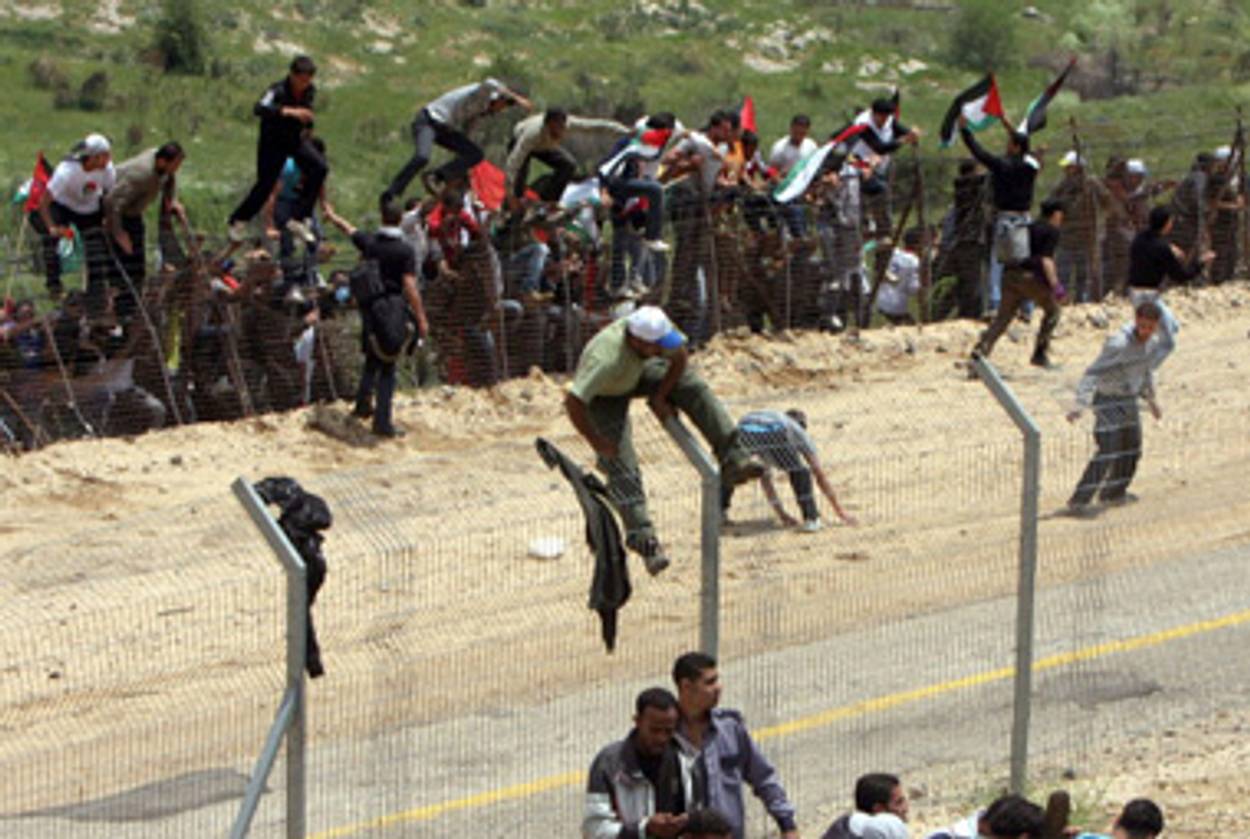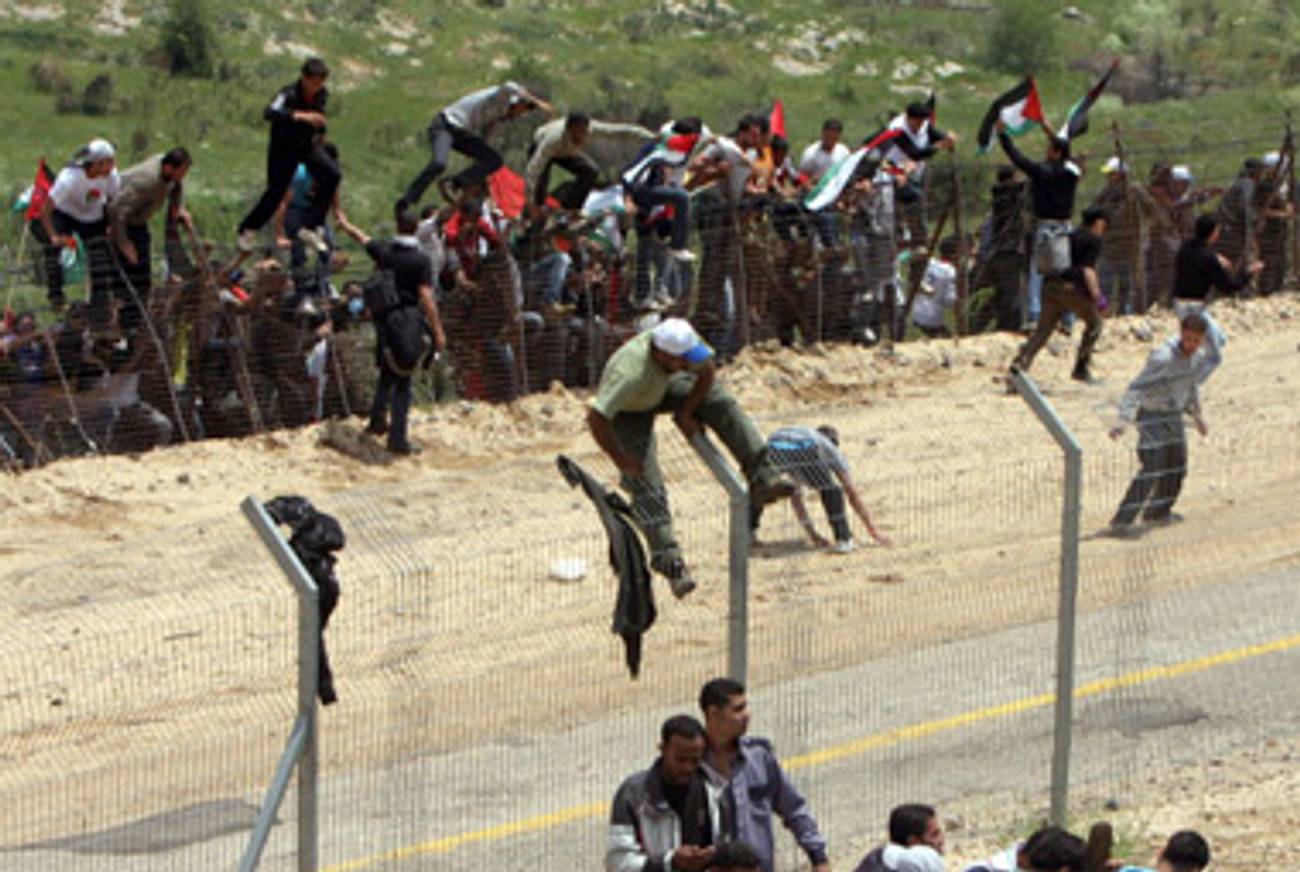The Arab Spring Comes to Israel
Syrian regime has own use for ‘Nakba Day;’ 16 deaths reported




In the most violent “Nakba Day” in years—the day on which Palestinians and other Arabs commemorate the “Nakba,” or “catastrophe,” that was (they argue) Israel’s declaration of independence and the attendant displacement of hundreds of thousands of Palestinians—yesterday, Palestinians tried to broach the Israeli border at four different places: Gaza and the West Bank, but also Lebanon and Syria; the Syrian border in particular has been almost totally quiet for decades, despite the fact that it includes the disputed Golan Heights. Planned marchers from Egypt and Jordan were restrained by those countries’ security services, which itself should tell you a lot about how the people in charge of Lebanon and Syria felt about their own protesters. In clashes that included Israeli military firing on crowds that tried to demolish barriers at the borders, more than a dozen (I generally see 16) were reported killed, and many more injured.
Everyone else has recommended it, but still, you should read this take by Andrew Exum, an active-duty counterinsurgency expert turned national security blogger. Israel’s response to the marching was not, he says, in line with past overreactions (such as—this is my example, not his—the response to the Gaza flotilla), but rather entirely understandable: “What were they supposed to do in the face of a breach of the border?” he asks. “And what did the protesters think would happen?” He adds, “You can’t really fault a military for protecting the territorial integrity of its state by force.”
Exum concludes, “Israel has been kidding itself if it had imagined itself immune from the non-violent, peaceful protests that have been sweeping the Arabic-speaking world,” and there are actually two separate ways, albeit stemming from the same place, in which yesterday represented the first day that the Arab Spring truly came to Israel. Place one is Syria: Much as the two-month-long (and counting) uprising against the Assad regime made Hamas feel threatened and spurred it to ostensibly reconcile with its bitter rival Fatah, the Assad regime, itself feeling threatened, needed a scapegoat, and there is surely no better scapegoat in the region than Israel; thus, the Assad regime, almost certainly, cynically harnessed the genuine feelings of its Palestinians by allowing them, for the first time, to actually storm the border, precisely in an effort to draw a response from Israel that could be used to distract its citizens from their uprising against the regime itself and to threaten the international community that support for deposing the regime could lead to more days like yesterday. It is certainly fair to point out that on the same day that four Syrian Palestinians were killed by the IDF for trying to cross in Israel, eight Syrians were killed by Syrian security services for trying to cross into Lebanon. In the context of the past two months, only the former event was extraordinary.
(By the way, contributing editor Jeff Goldberg rightly calls out Times Jerusalem bureau chief Ethan Bronner for his overly earnest treatment of just whether, in fact, the Assad regime let this happen on purpose, when past history indicates that angry protesters reach that border only when the regime wants them to. Likewise, Anthony Shadid’s more fair-minded Times news analysis was headlined, as of last night, “A Random Border Skirmish? Or Is Syria Playing the Israel Card?” when in fact the piece itself makes very clear that it’s the latter. [Also, “random”? It was Nakba Day!] I’m usually not one of those people when it comes to the Times, but come on.)
It would be convenient if the entire thing could be blamed on the awful Assad regime, but it of course can’t. The Arab Spring, and the examples especially of Tunisia and Egypt, in which longtime despots were replaced through popular protests, have made Arabs feel newly empowered about their ability to influence how they are governed. It has also unleashed ugly forces that these despots had kept contained (violence against Egyptian Christians continued this weekend.)
The Arab Spring has made Palestinians feel as though they can shape their destiny vis-à-vis Israel as never before, and if reconciliation—in which a group that calls for Israel’s destruction, Hamas, was welcomed into the main governing body—is any indication; if ostensibly moderate President Mahmoud Abbas’s recent statements that Palestinians will never give up the right of return and that yesterday’s dead were martyrs are any indications; and if one of the most restive Nakba Days in recent years is any indication; then as of right now, the mainstream Palestinian vision of the Palestinian future is incompatible with the mainstream Israeli vision of the Israeli future. That doesn’t justify Israel’s ignoring these latest events. Rather, it demands two things: tactically, a combination of restraint and insistence on red lines; and strategically, inventive diplomacy and compassion. Israel demonstrated the former yesterday; here’s hoping the latter is on the way.
Israeli Troops Fire as Marchers Breach Borders [NYT]
Just Another Sunday in the Levant [Abu Muqawama]
A Random Border Skirmish? Or Is Syria Playing the Israel Card? [NYT]
How to Understand the Golan Heights Demonstrations? [Goldblog]
Scores Wounded in Latest Religious Clashes in Egypt [WP]
Earlier: Has Assad Reached Our Breaking Point?
On Reconciliation, ‘The Devil Is In the Details’
Marc Tracy is a staff writer at The New Republic, and was previously a staff writer at Tablet. He tweets @marcatracy.